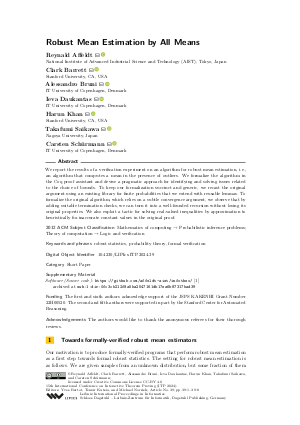LIPIcs.ITP.2024.39.pdf
- Filesize: 0.78 MB
- 8 pages

 Creative Commons Attribution 4.0 International license
Creative Commons Attribution 4.0 International license

We report the results of a verification experiment on an algorithm for robust mean estimation, i.e., an algorithm that computes a mean in the presence of outliers. We formalize the algorithm in the Coq proof assistant and devise a pragmatic approach for identifying and solving issues related to the choice of bounds. To keep our formalization succinct and generic, we recast the original argument using an existing library for finite probabilities that we extend with reusable lemmas. To formalize the original algorithm, which relies on a subtle convergence argument, we observe that by adding suitable termination checks, we can turn it into a well-founded recursion without losing its original properties. We also exploit a tactic for solving real-valued inequalities by approximation to heuristically fix inaccurate constant values in the original proof.



Feedback for Dagstuhl Publishing